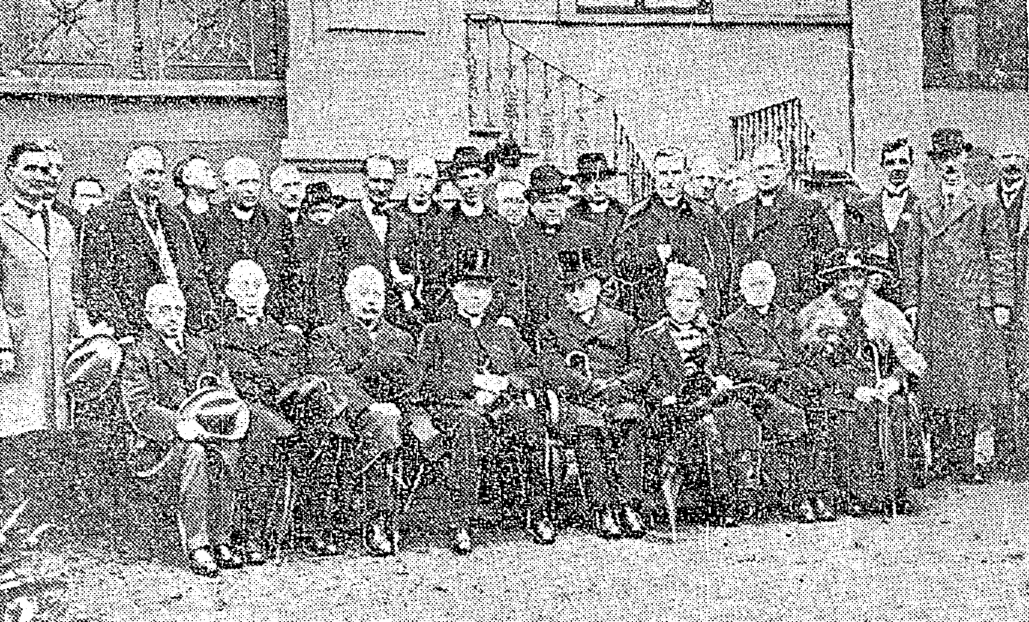Catholic Truth Society considers role of Labour movement and women
Minister Kevin O’Higgins speech disrupted by prisoner protesters
Dublin,11 October 1923 - ‘You cannot serve God and Mannon’, a leading Catholic cleric has told a Mass held in connection with the opening of the annual Catholic Truth Society’s Conference at the Pro-Cathedral in Dublin yesterday.
Before a congregation that included thirteen other members of the Catholic hierarchy and President William T. Cograve, the Most. Rev. Dr. O’Donnell, Archbishop of Attalia and co-adjutor archbishop of Armagh, said that the achievement of the Christian ideal would see the banishment from industrial life of the evils of profiteering and undue concentrations of wealth on one side and unemployment and slums on the other.
In respect of Labour relations, which are visibly strained across many industries at present, Archbishop O’Donnell recommended stronger unions of workers and employers in order that their interests be harmonised as users and consumers of goods and to assist in helping regulate prices and prevent profiteering. Referring to recent Press speculation, the Archbishop stressed a preference for the use of voluntary conciliation or arbitration boards to resolve issues of disagreement and prevent industrial strife.
Political and social affairs continued to provide a focus for subsequent discussions at Conference, not least when the Minister for Home Affairs, Mr. Kevin O’Higgins, rose to deliver a paper on ‘The Catholic Layman in Public Life’ and was interrupted by a group of women protesting women, to the fore of which was Mrs. Maud Gonne MacBride. No sooner had the Minister begun to speak when Mrs. Gonne McBride interrupted with a question which is believed to have been - ‘Might I ask if there was a prisoner untried and uncharged shot in Mountjoy?’
Mrs. Gonne McBride was immediately surrounded by stewarts and escorted out but continued to ask questions on the prisoner issue, a cry that was taken up by about six other women in the room. According to reports, one of the women claimed to be the mother of four prisoners and another shouted towards the stage, where Mr. O’Higgins had taken his seat, ‘You murdered Rory O’Connor.’
Pathé newsreel footage of Kevin O’Higgins at 1923 Catholic Truth Society Conference
When all the protestors were removed from the venue and Mr. O’Higgins returned to the theme of his talk, he noted that there was a great need for the assistance of the best type of Catholic layman in public and private life. The Minister said that he always understood Catholicism to be a complete doctrine and rule of life and he did not think it appropriate for men to insulate their consciences in public life. There was, he believed, a feeble civic sense in Ireland as citizens did not consider they had concrete duties beyond their families. They had not the slightest compunction in neglecting their liabilities to the State.
It was astonishing, the Minister added, that Machiavellianism in politics was so popular in a country like Ireland and it was high-time for the Catholic layman to break away from both fanaticism and Machiavellianism, and to revert to Catholic social doctrine which was the most distinctive social code ever preached.
As well the position of the Catholic layman, the role of women in Irish Society was also to the fore at the Conference. Rev. M. Creedon, who is based on Francis Street, read a paper on the ‘The Catholic Woman in Social Service’, while ‘The Catholic Woman in the Labour movement’ was the subject of a paper delivered by Rev. J. O’Kelleher, Waterford, at the closing session of the Society’s Conference. Fr. O’Kelleher predicted that women’s labour organisations would grow and develop, while urging the need for wider and more responsible union leaderships.
Responding to Fr. O’Kelleher’s paper, Fr. Lawrence, O.S.F.C., declared that every woman and girl worker should belong to a union and they should elect wise and proper leaders. Fr. Lawrence added that while 95% of workers were Catholics, their unions were affiliated with Protestant English unions. Irish workers should be able to stand on their two feet, so there must, he insisted, be Irish unions. The Catholic Truth Society of Ireland was established in 1899.
[Editor's note: This is an article from Century Ireland, a fortnightly online newspaper, written from the perspective of a journalist 100 years ago, based on news reports of the time.]





















